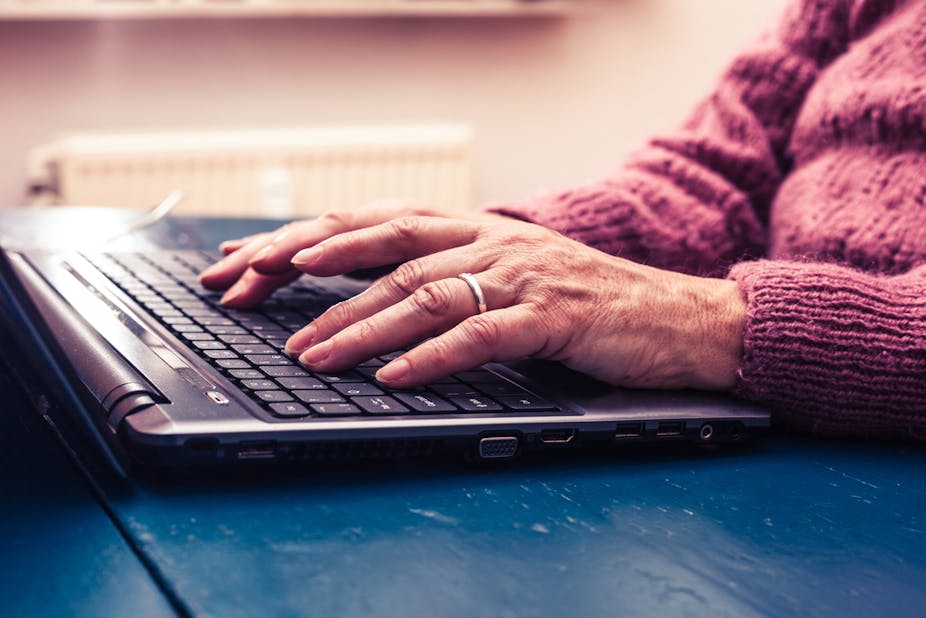With more health information going online every day, it has never been easier to proactively manage our health. The problem is, the people who would benefit the most seem to be using it the least.
Older adults typically have a greater need for health-related information but their health literacy – their capacity to obtain, process and understand health information to make appropriate health decisions – is the lowest among all age groups.
Research shows that only about 3% of the elderly know how to access health-related information. And of those older adults who seek health information online, few are careful to evaluate its credibility. This points to the need for interventions to assist older adults’ use of computers and the internet.
There are clear benefits, both at a personal and social level, to teaching the elderly how to access health information and to use the internet generally. Efforts have been made to address this skills gap, but with limited success.
What works?
Sometimes the best solutions to behavioural problems are those that graft naturally onto people’s instinctive behaviours. The European Union has done just that with the Grandparents and Grandchildren program that puts old and young together so that the old might learn from the young.
This approach is working, probably because it taps into the natural instinct we have to connect with our blood relatives. School and college-age people are spending time with their grandparents for the purpose of learning how to use technology.
Beyond the family benefits, there is the potential for great savings to be made on health-care costs, keeping people in their own homes and out of hospital; a win-win situation.

Several health literacy programs are being trialled that involve helping the elderly to use the internet to find and appraise web-based cancer information. The participants in these programs reported getting better at doing this.
Follow-up studies show that once having learnt, the participants continued to use the internet to search for health-related information.
Benefits of digital literacy
Google heads recently announced they will improve the validity of health-related searches by creating a database of commonly searched medical conditions that have been fact-checked by doctors. When consumers search for these conditions, these pre-vetted facts will appear at the top of the search results. It is hoped that this will get people the right information faster.
Once the elderly know how, they can proactively manage their health by accessing a wealth of information on many topics. A person with type 2 diabetes, for instance, could learn how to live on a low-glycaemic index diet, thus reducing the need for medication and lowering their risk of heart attack. They could also make use of the many health and fitness apps now available. SmartWatch technology is taking the whole business to a higher level of sophistication.
Important for healthy ageing is keeping the social bonds of family and friends strong and maintaining a sense of social connection. Not an easy thing to do in today’s world with friends and family living far and wide for employment. Skype, email and social media can go a long way to making people feel connected with those they love.

With an ocean of knowledge just a few key-strokes away, there is plenty of scope for people to explore their interests. No matter how specialised they might be, you can find a community of interest to get involved with. It is well-known that keeping one’s mind active helps to delay cognitive decline and the on-set of dementia.
Many elderly people have lived interesting lives. They have things to say, but no-one on hand who is prepared to listen. These folks might want to record their experiences for posterity by writing their richly-textured biographies. Who knows what gems of wisdom might be contained in such accounts?
Next steps
It takes a village to raise a child, as the old saying goes, but we might also add that it is a two-way street – it takes a community to look after the elderly. We need to put in some time and effort into finding better ways to do this.
One of the best things we can do for the older members of our community is to give them the means to better look after themselves by teaching them how to use the technology that the rest of us take for granted. An Australian pilot study to adapt the Grandparents and Grandchildren would be a good start.
It is true that not everyone in this age group will want to learn. Some will be content to let it pass them by. But others will see the possibilities and eagerly embrace the potential for improvements to both quality and quantity of life.

